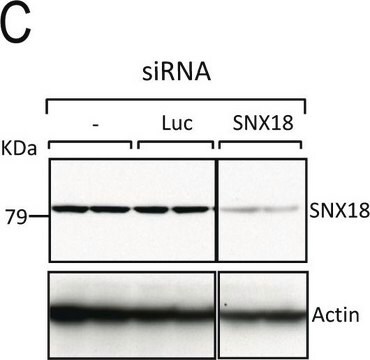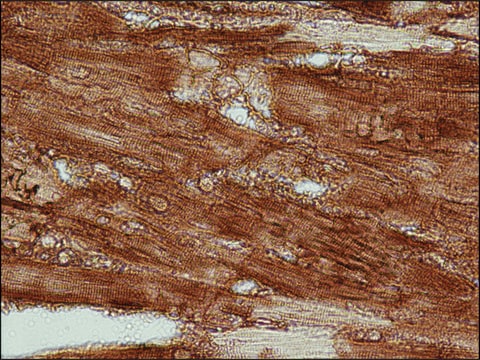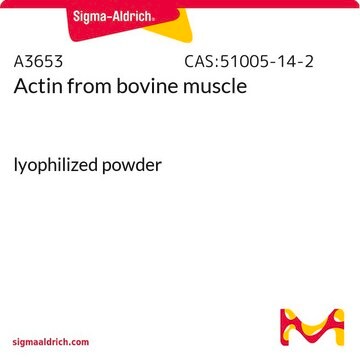A3853
Anti-Actin antibody, Mouse monoclonal
clone AC-40, purified from hybridoma cell culture
Synonyme(s) :
Monoclonal Anti-Actin antibody produced in mouse
About This Item
Produits recommandés
Source biologique
mouse
Niveau de qualité
Conjugué
unconjugated
Forme d'anticorps
purified from hybridoma cell culture
Type de produit anticorps
primary antibodies
Clone
AC-40, monoclonal
Forme
buffered aqueous solution
Conditionnement
antibody small pack of 25 μL
Technique(s)
immunocytochemistry: 10-20 μg/mL using chicken or human fibroblasts by methanol/acetone fixation
immunohistochemistry: suitable
indirect ELISA: suitable
microarray: suitable
western blot: 0.5 μg/mL using chicken or human fibroblasts
Conditions d'expédition
dry ice
Température de stockage
−20°C
Modification post-traductionnelle de la cible
unmodified
Catégories apparentées
Description générale
The antibody recognizes an epitope located on the C-terminal end of actin conserved in all actin isoforms. It specifically labels actin in a wide variety of tissues and species. The epitope recognized by the antibody is resistant to formalin-fixation and paraffin-embedding. Zinc-formalin, B5, ethanol, methacarn, Brunnel′s or Bouin′s solutions may also be used as fixatives.
Monoclonal Anti-Actin (mouse IgG2a isotype) is derived from the AC-40 hybridoma produced by the fusion of mouse myeloma cells and splenocytes from an immunized mouse. A synthetic actin C-terminal peptide, attached to Multiple Antigen Peptide (MAP) backbone was used as the immunogen. The isotype is determined using Mouse Monoclonal Antibody Isotyping Reagents, Catalog No. ISO2
Spécificité
Immunogène
Application
Monoclonal Anti-Actin antibody produced in mouse has been used in the detection of actin in human bronchial epithelial cells using immunohistochemical assays. It has also been used in immunofluorescence detection in cardiomyocytes.
Actions biochimiques/physiologiques
The actin in cells of various species and tissues are very similar in their immunological and physical properties characterized by electrophoresis and amino acid sequence analysis. They mediate cytoskeletal remodeling during T cell activation. Mutation in the γ-actin and β-actin gene is associated with a developmental disorder called Baraitser-Winter syndrome. Mutation in the γ-actin leads to hearing loss.
Forme physique
Stockage et stabilité
Autres remarques
Clause de non-responsabilité
Not finding the right product?
Try our Outil de sélection de produits.
En option
Code de la classe de stockage
10 - Combustible liquids
Classe de danger pour l'eau (WGK)
WGK 2
Point d'éclair (°F)
Not applicable
Point d'éclair (°C)
Not applicable
Équipement de protection individuelle
Eyeshields, Gloves, multi-purpose combination respirator cartridge (US)
Certificats d'analyse (COA)
Recherchez un Certificats d'analyse (COA) en saisissant le numéro de lot du produit. Les numéros de lot figurent sur l'étiquette du produit après les mots "Lot" ou "Batch".
Déjà en possession de ce produit ?
Retrouvez la documentation relative aux produits que vous avez récemment achetés dans la Bibliothèque de documents.
Les clients ont également consulté
Notre équipe de scientifiques dispose d'une expérience dans tous les secteurs de la recherche, notamment en sciences de la vie, science des matériaux, synthèse chimique, chromatographie, analyse et dans de nombreux autres domaines..
Contacter notre Service technique
















